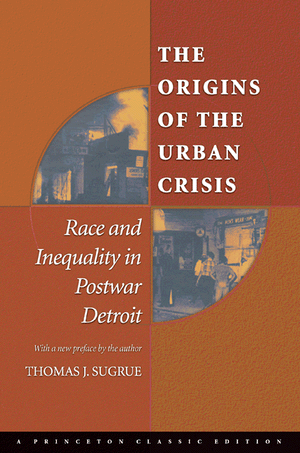
The News is in the middle of a very good series on race relations and racial equality in the Detroit area 40 years after the riot/civil disturbance/rebellion. There's some surprising new polling data, and if you don't know much about the riot, it's a good primer.
The series also reminded me I need to man up and read The Origins of the Urban Crisis. From what I understand, you're not even allowed to talk about Detroit's problems until you've read this book. I borrowed it from a friend a few months ago, and I haven't been able to bring myself to start it -- there are too many other books around that are way more fun.
Jack Lessenberry's column on the riot is also worth reading, as usual.
The series also reminded me I need to man up and read The Origins of the Urban Crisis. From what I understand, you're not even allowed to talk about Detroit's problems until you've read this book. I borrowed it from a friend a few months ago, and I haven't been able to bring myself to start it -- there are too many other books around that are way more fun.
Jack Lessenberry's column on the riot is also worth reading, as usual.
2 comments:
Reading a book about urban crisis is not going to help you learn anything about Detroit's problems. The only way to get any credibility on the subject is to actually live in Detroit. I have lived in Detroit for the past 4 years, and as a result am extremely credible on the subject. Therefore, I suggest that you take to heart what I suggest are Detroit's real problems. They have nothing to do with "urbanity".
1. The only people who actually have any pride in Detroit are White "Detroit soul" t-shirt- wearing kids from Ann Arbor
http://profile.myspace.com/index.cfm?fuseaction=user.viewprofile&friendid=179610431 who have never actually been to Detroit, but reason that since they occasionally see a Black person, their hometown must be close enough. Most people who live in Detroit dislike it to the extreme, and express this distaste by throwing trash on their own front lawns.
2. The jewel of Detroit, Wayne State, an oasis of hope in a desert of misfortune, is actually a black hole that lures in suburbanite-types by promising "Real World Education". However, no one actually graduates from Wayne State. They stop taking classes, and then spend the next ten years smoking weed and writing shitty poetry about their feelings, which they were not aware of until they got to Wayne and took an English class.
3. It's hard to become literate and employed when you're continuously high, as many of Detroit's subsidized housing residents are, and most of your day consists of walking to the grocery store to buy cigarettes and pizza, and then back home to smoke more weed until you're ready to eat more pizza, or to produce children, or to sell to Wayne State kids who need to relax so that they can write more poetry.
4. If Detroit didn't have any problems, no one would really care about it, and would recognize it for the bummer that it is. This would put it on par with cities like Minneapolis and Milwaukee, which are only known for being in the boring Midwest and having silly names. Detroit's problems are probably some of the best things it has going for it; they are the reason why wearing a t-shirt with "313" written on it is about as popular as wearing an "I love my attitude problem" t-shirt.
"it's a despotic building. it wants us to feel like termites."
Post a Comment